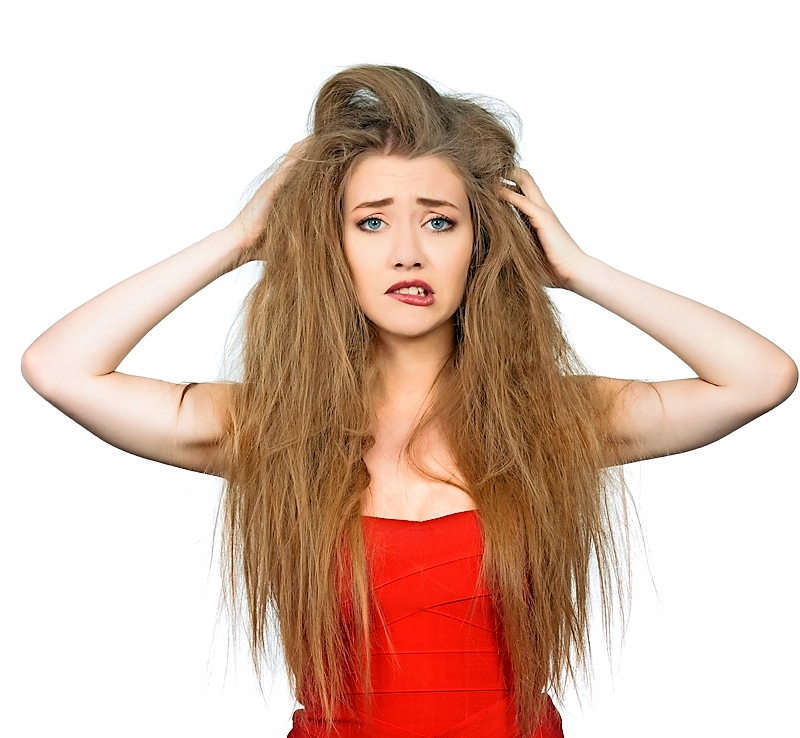Hair Repair—Reversing the damage caused by stress
By Mary Kay Kleist
August 2014 View more Health & Fitness
 When we think of stress, many of us think about ‘pulling out’ our hair. However, prolonged periods of stress can actually lead to chemical and physical changes in your hair’s color, texture, and body. Does your scalp itch and feel more sensitive when you’re under pressure? Do you notice more hair left in your brush during stressful times?
When we think of stress, many of us think about ‘pulling out’ our hair. However, prolonged periods of stress can actually lead to chemical and physical changes in your hair’s color, texture, and body. Does your scalp itch and feel more sensitive when you’re under pressure? Do you notice more hair left in your brush during stressful times?
Stress and Hair Loss
Some experts say stress may be a reason for unexplained hair loss. “Stress causes an increased release of cortisol. This can cause increased shedding of scalp hair. In response to chronic stress, levels of male hormones, such as testosterone and DHEAS, also rise, leading to an increased oiliness of the scalp and greasiness of the hair as well as premature shedding of mature hair follicles,” said Dr. Rebecca Tung, Loyola University Health System. Regular exercise and extra sleep can help control the damage to your hair caused by stress. “Sometimes I will suggest nutritional support such as the vitamin biotin plus a one-a-day multivitamin,” said Dr. Tung.
Reversing the Damage With A Proper Diet
Doing your best to eat well and take good care of yourself during times of stress is important. “Diet can totally impact how you feel and how you look. After 30 days you can start to notice a difference, but it can take up to three to four months to see the maximum impact. Stick with it and you will see your reflection go from blah to ta-dah,” said Dawn Jackson Blatner, registered dietitian nutritionist.
Hair Repair
Stressed hair is dry and fragile, and the beating of the blow-dryer and other heated styling tools can make it worse. “Proper hair care is important to maintain healthy hair during stressful times. Use a professional shampoo and conditioner specified for your hair type as well as staying products to protect the hairs integrity. Try to refrain from over-heating or styling as well with over-processing color which can lead to damage. Using a specified hair treatment once a week is also recommended,” said hairstylist Anne Cowie of C’Zar Salon and Spa in Naperville. “I tend to inquire about a client’s hair loss possibly caused by stress if I notice a significant amount of hair loss between appointments where the hair loss has no sort of patterned area.”
Read your labels. Moisturizers like silk proteins, panthenol, glycerol and aloe vera are life savers for stressed hair. Plant oils and proteins can also work wonders. Active components like Macadamia nut oil, Argan oil, Shea butter or wild brier oil coat every individual hair with a very fine protective layer. They repair the cuticle layer.
Be gentle when styling damaged hair. Freshly washed hair is extremely sensitive. Instead of vigorously rubbing your hair dry, it’s better to wrap it in a towel. Then use a wide-toothed comb. If you don’t have time to let your hair air dry, keep it quick with the blow dryer. Until your hair recovers, avoid irons.
Split ends are the most obvious problem of stressed hair. Have your stylist trim the edges and recommend a product to seal the ends. Your hair will look thicker and healthier.
Diet Tips For Healthy Hair
Pump Up The Protein—Include a small dose of protein at each meal and snack to keep hair follicles strong. (Poultry, lean beef, fish, beans and nuts)
Feed Your Strands Silica—The mineral silica is thought to improve hair thickness. (Bananas, beer, green beans, oats and raisins)
Minerals Are A Must—Minerals such as iron, copper, magnesium and selenium help keep hair growth healthy. (Soybeans, lentils, mushrooms, sunflower seeds, almonds, potatoes and Brazil nuts)
Get A Boost With Biotin—Biotin may help hair grow faster, stay stronger and prevent brittleness. (Eggs, peanuts, salmon, sunflower seeds and strawberries)
Source: Dawn Jackson Blatner


